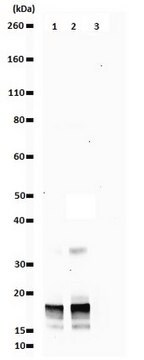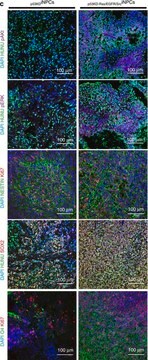MABC631
Anti-KLF4 Antibody, clone 1E6
ascites fluid, clone 1E06, from mouse
Sinónimos:
Krueppel-like factor 4, Epithelial zinc finger protein EZF, Gut-enriched krueppel-like factor
About This Item
Productos recomendados
biological source
mouse
Quality Level
antibody form
ascites fluid
antibody product type
primary antibodies
clone
1E06, monoclonal
species reactivity
human
technique(s)
immunohistochemistry: suitable
western blot: suitable
isotype
IgG1
NCBI accession no.
UniProt accession no.
shipped in
wet ice
target post-translational modification
unmodified
Gene Information
human ... KLF4(9314)
General description
Immunogen
Application
Western Blotting Analysis: A 1:3,000 dilution from a representative lot detected KLF4 in transfected HEK293 cell lysates.
Optimal working dilutions must be determined by end user.
Apoptosis & Cancer
Apoptosis - Additional
Quality
Immunohistochemistry Analysis: A 1:200-1,000 dilution from a representative lot detected KLF4 in human lung cancer and colon tissues.
Optimal working dilutions must be determined by end user.
Target description
Physical form
Storage and Stability
Handling Recommendations: Upon receipt and prior to removing the cap, centrifuge the vial and gently mix the solution. Aliquot into microcentrifuge tubes and store at -20°C. Avoid repeated freeze/thaw cycles, which may damage IgG and affect product performance.
Analysis Note
Human lung cancer and colon tissues
Disclaimer
¿No encuentra el producto adecuado?
Pruebe nuestro Herramienta de selección de productos.
Storage Class
12 - Non Combustible Liquids
wgk_germany
nwg
flash_point_f
Not applicable
flash_point_c
Not applicable
Certificados de análisis (COA)
Busque Certificados de análisis (COA) introduciendo el número de lote del producto. Los números de lote se encuentran en la etiqueta del producto después de las palabras «Lot» o «Batch»
¿Ya tiene este producto?
Encuentre la documentación para los productos que ha comprado recientemente en la Biblioteca de documentos.
Nuestro equipo de científicos tiene experiencia en todas las áreas de investigación: Ciencias de la vida, Ciencia de los materiales, Síntesis química, Cromatografía, Analítica y muchas otras.
Póngase en contacto con el Servicio técnico





![Poly[(R)-3-hydroxybutyric acid] natural origin](/deepweb/assets/sigmaaldrich/product/structures/129/476/7d1c924b-f644-4889-a2d6-d7a923ce382c/640/7d1c924b-f644-4889-a2d6-d7a923ce382c.png)
